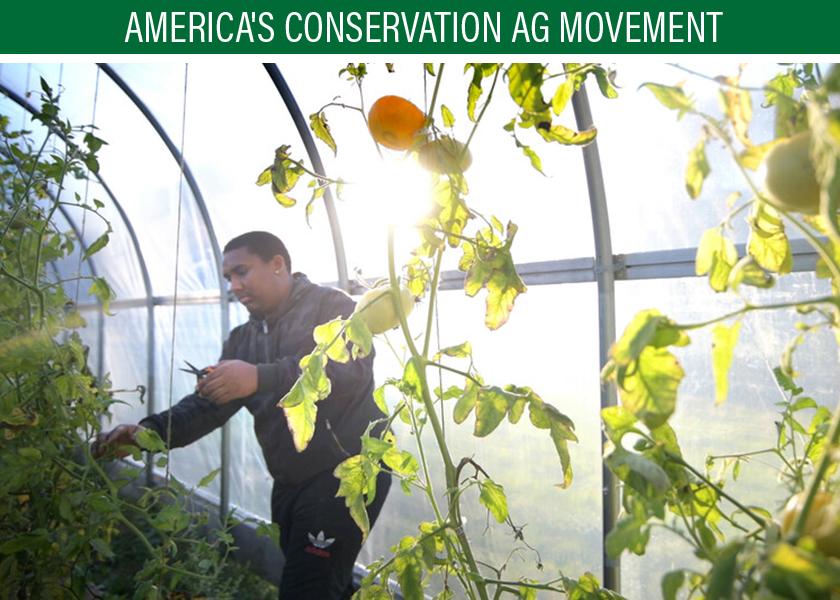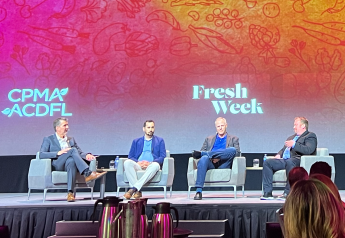Guest Commentary: Sustainable Food Success Stories From Connecticut

Building trust in food begins with empowering farmers through one of the largest and most diverse conservation- and sustainability-focused public-private partnerships in our nation’s history: America’s Conservation Ag Movement. To find the latest news and resources related to the Movement, visit AgWeb.com/ACAM.
This article was written by Shuresh Ghimire, Jiff Martin, Stacey Stearns, and Indu Upadhyaya, University of Connecticut Extension.
A holistic approach to farming is enabling leaders at University of Connecticut (UConn) Extension to help producers integrate sustainability, environmental integrity, economic vitality and social equity into their operations. In this guest post, the UConn team shares Extension’s impact in sustainable foods—including helping fruit and vegetable growers, beginning farmers and Tribal farmers; sharing insights on integrated pest management; and putting local food on students’ plates. UConn Extension is the winner of the monthly Farm Journal Monthly Story Lead Contest, a partnership between eXtension and Trust In Food, a Farm Journal initiative. In September 2020, the contest focused on surfacing stories of Cooperative Extension helping local consumers and farmers to connect and better understand the environmental and health and nutrition-related impact of food produced by U.S. farmers.
A sustainable food system can meet our needs for fresh, healthy, affordable food today without jeopardizing the ability of future generations from doing the same.
This is a global issue that we are addressing locally, statewide, and regionally in New England. In Connecticut, 12% of households experience food insecurity, 33% of children are overweight or obese (more than half of whom are Hispanic and African American), an estimated one out of five residents eat no vegetables daily, 33% of our census tracts live more than a half mile from a food retailer, and only 10% of our cropland is used to harvest fruits and vegetables.
Our goal is to address Connecticut’s food-related challenges to human health and sustainable use of natural resources through research, education, and public engagement. To do this, we focus on diverse and innovative animal and crop production systems, increasing access to nutritional and healthy food, and securing a sustainable, safe, and resilient food supply.
UConn Extension outreach and training programs in agriculture and food included a multi-faceted approach to addressing the issue that includes growers, consumers, and youth. Our programs reached residents in all 169 cities and towns in Connecticut. Key program areas include agricultural production (fruits, vegetables, specialty crops), farm marketing, food safety, new and beginning farmers, risk management, and urban agriculture. We also offered two workshops dealing with farmer stress, signs, communication, and resources that were attended by over 150 farmers and agriculture service providers.
Program impacts were leveraged by several USDA grants that increased our capacity to serve Connecticut and beyond in the areas of agricultural risk management, integrated pest management, food safety, and new and beginning farmers. For example, the Solid Ground Training Program is offered for new farmers and funded by USDA-NIFA Beginning Farmer and Rancher Development Program Award #2016-70017-25416. We leveraged this grant funded project by collaborating with Extension educators and resources available across all programs. We also work with the Mashantucket Pequot Tribal Nation through a USDA-FRTEP grant.
“There has been a substantial gain in the knowledge and skills regarding growing food, writing a business plan, nutrition, and health since we started working with the UConn Extension educators,” says Jeremy Whipple, a member of the Mashantucket Pequot Tribal Nation.
Our vegetable integrated pest management education was delivered to over 550 vegetable growers and stakeholders every week from May to September 2019 and 2020 through 19 weekly vegetable pest alerts each year focusing on pests, pest management and decision making, and safe pesticide use. Farm visits, workshops, and consultations were also provided to growers.
In spring of 2020, our Vegetable Program launched an online Vegetable Production Certificate course for the first time with an objective to effectively deliver information to beginner vegetable producers, especially when in-person interactions are limited. The course had seven online modules, each module with a self-paced video, supplemental materials, and a short quiz. In the post-course evaluation survey (total number of course participants = 23), respondent indicated on average 34% increase in their knowledge from the course.
We had 474 Fruit growers and industry members receive 116 fruit messages in 2019 covering pest information, management strategies, cultural practices, meetings and educational programs. Louis Bacchiocci, one of our farmers, stated, “These emails are very helpful. Even when you know the information it serves as a great reminder of when we ought to be applying production strategies.”
The achievement of the UConn Integrated Pest Management Program was assessed by a collective impact assessment perspective. In 2019, 45.8% of respondents (N = 1,221; n = 233; 19% response rate) indicated their pesticide use decreased after working with the UConn IPM program while only 2.7% indicated it increased. Eighty percent responded they feel more knowledgeable of IPM options because of the UConn IPM program and 64.1% indicated they conduct IPM differently because of the UConn IPM program.
Put Local On Your Tray promotes local food in school cafeterias and helps to connect farmer and school food buyers. Over the past year, we had 92 towns and districts take a pledge to serve locally grown products in their school cafeterias, choosing from among 15 products supplied by more than 45 farms in the project's Farmer Directory.
Salli Szczesiul, the kitchen manager at the Goshen school stated: “We purchased the purple daikon radish, red beets and red apples from the farmer food hub. I roasted the beets, diced them along with the radish and beets to make a cold salad. We pre-portioned it into our 4 oz. serving cups to put on our daily rainbow tray, but also had a container of it that we could put a sample size on a student's tray to just give it a try. Younger students were a little more apprehensive about trying, but there are always a handful who will exclaim, ‘I love beets!’ The older kids loved the heart we made from the radish, and it continues to be a hit on our rainbow tray. We either cut it into matchsticks or dice it for serving.”
Peter Hayward of Hayward Farms in New Hartford also values the partnerships with schools: "I have been selling to Avon schools for over ten years now and to Region 10 (Harwinton-Burlington) for over twenty years. We also have been selling fruit to the Thomaston and Canton school systems for several years. We would never be able to market our entire crop without these very important outlets.”
COVID-19 has caused school food to shift dramatically from cafeteria service to boxes, bags, and in-classroom meals at socially distanced desks. In response, the Put Local On Your Program has developed new digital tools and fun activity books for students that can be distributed with meals for remote learning. In celebration of CT Grown for CT Kids Week, staff worked in close collaboration with Dept. of Education and Dept. of Agriculture to produce a new video in time called the ‘Hard Core Apple Crunch Challenge.’
Food safety is a core component of the food systems programs. Our educators collaborate on programs and offer food safety workshops and certifications statewide to producers and processors. The food safety program collaborates with other states and organizations throughout the state including the Department of Agriculture.
Our educators’ partner with the Plant Diagnostic Laboratory at UConn to diagnose and serve our members. We also work with our 4-H youth development program and the Master Gardener program to reach other audiences.
The impact of our combined efforts increased agriculture production and viability in Connecticut, as well as local food consumption among our residents. We are addressing Connecticut’s food-related challenges to human health and sustainable use of natural resources with a collaborative effort that uses science-based research, education, and public engagement. We continue to broaden the scope of our audiences, and impact.







